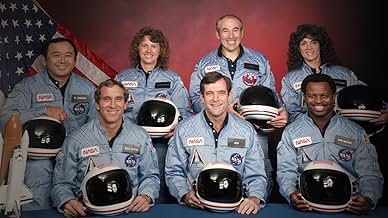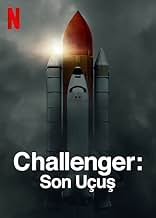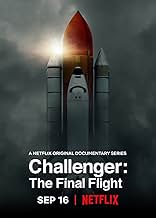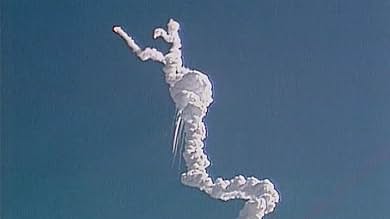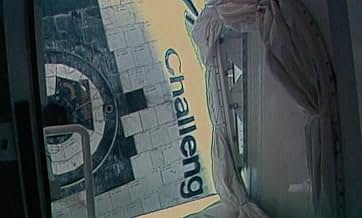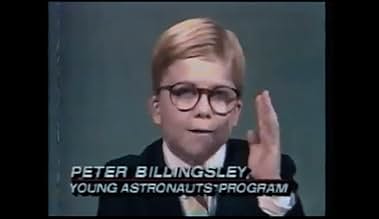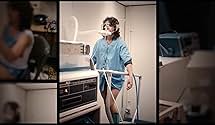El último vuelo del Challenger
Título original: Challenger: The Final Flight
PUNTUACIÓN EN IMDb
7,8/10
8,4 mil
TU PUNTUACIÓN
Añade un argumento en tu idiomaFour-part docuseries on the 1986 Challenger space shuttle disaster, unpacking an indelible moment for a generation of Americans.Four-part docuseries on the 1986 Challenger space shuttle disaster, unpacking an indelible moment for a generation of Americans.Four-part docuseries on the 1986 Challenger space shuttle disaster, unpacking an indelible moment for a generation of Americans.
- Premios
- 2 nominaciones en total
Explorar episodios
Reseñas destacadas
The facts that are known about this inexcusable disaster are all over the net. If you are interested in the technical aspects of the accident read the Rogers Commission report.
This is the story of the Challenger disaster from the viewpoint of a lot of people that were there at the time. I found those views compelling and with all of that background information, by the fourth episode I felt like I was back in 1985. It was like I was right there, with all of those people.
Not exactly on topic but a bit of trivia: I worked for Morton Thiokol when the Challenger accident happened. There was a mandatory employee meeting the day after the disaster. We were all required to sign non-disclosure agreements. We were told that if we were caught saying ANYTHING, even the word Challenger, to ANYONE (even co-workers), we would be fired immediately.
This is the story of the Challenger disaster from the viewpoint of a lot of people that were there at the time. I found those views compelling and with all of that background information, by the fourth episode I felt like I was back in 1985. It was like I was right there, with all of those people.
Not exactly on topic but a bit of trivia: I worked for Morton Thiokol when the Challenger accident happened. There was a mandatory employee meeting the day after the disaster. We were all required to sign non-disclosure agreements. We were told that if we were caught saying ANYTHING, even the word Challenger, to ANYONE (even co-workers), we would be fired immediately.
I found it interesting that the name "Roger Boisjoly" wasn't mentioned once. The man who probably fought harder than anyone to fix the o-ring problem gets passed by?
While the series held my interest for all four episodes, a little more tech and a little less teacher would have been better, for me at least.
Full disclosure: I am a space enthusiast. I would have loved to go to space. And I vehemently support the US manned space program.
However... I have lived through all three major US space catastrophes, where we managed to kill (as of today) 17 astronauts in spacecraft (albeit three of those on the ground), and the sad truth about each of those tragedies is that they occurred because of people who put "schedules" and/or "money", ahead of crew safety. My "impression" is that, at the moment, we seem as though we might be over that hurdle (in our space program), but if for no other reason, this four-part documentary should serve as a cautionary tale, as it clearly shows how seemingly intelligent people, can make extremely dumb (or selfish) decisions, with total disregard for human life. It also clearly shows how, when incidents like these occur, you absolutely need to bring in a bevy of _independent_ outsiders to oversee the inevitable investigations that follow, because the guilty parties (be they individuals, or corporations) will go out of their way to try to gloss over their culpability, in having caused failures on this scale.
The focus of this documentary is different than a lot a previous efforts that cover this tragedy. It does go into a lot of detail about the root cause of the accident, how it was already a known (and very concerning) problem, and how/why managers within the contractor (Morton Thiokol) and NASA ranks choose to rationalize away the risks, simply to try to keep the shuttle program "on schedule". But this documentary spends just as much time talking about the seven people who lost their lives, and numerous family members and friends of the astronauts participated in new interviews, to give a more thorough understanding of who these people were, and what their lives were before the tragedy, and could have been, had their lives not ended so unnecessarily.
Also, there are interviews with people who risked the livelihoods to come forward during the Rogers Commission investigation, to provide information that no one else was providing, which clearly detailed the root cause of the accident, and the culpability of the people who decided to ignore the warnings of "impending doom". And, as with the family members, there are also new interviews (somewhat surprisingly) with the key (living) Thiokol and NASA employees who participated in the (flawed) recommendation to launch Challenger, even though their own engineers were vehemently opposed to doing so.
Anyway, this is an important slice of US Space Program history, and the series gives a solid understanding of how/why this tragedy occurred, as well as an "up close and personal" look at the people involved. I highly recommend it.
However... I have lived through all three major US space catastrophes, where we managed to kill (as of today) 17 astronauts in spacecraft (albeit three of those on the ground), and the sad truth about each of those tragedies is that they occurred because of people who put "schedules" and/or "money", ahead of crew safety. My "impression" is that, at the moment, we seem as though we might be over that hurdle (in our space program), but if for no other reason, this four-part documentary should serve as a cautionary tale, as it clearly shows how seemingly intelligent people, can make extremely dumb (or selfish) decisions, with total disregard for human life. It also clearly shows how, when incidents like these occur, you absolutely need to bring in a bevy of _independent_ outsiders to oversee the inevitable investigations that follow, because the guilty parties (be they individuals, or corporations) will go out of their way to try to gloss over their culpability, in having caused failures on this scale.
The focus of this documentary is different than a lot a previous efforts that cover this tragedy. It does go into a lot of detail about the root cause of the accident, how it was already a known (and very concerning) problem, and how/why managers within the contractor (Morton Thiokol) and NASA ranks choose to rationalize away the risks, simply to try to keep the shuttle program "on schedule". But this documentary spends just as much time talking about the seven people who lost their lives, and numerous family members and friends of the astronauts participated in new interviews, to give a more thorough understanding of who these people were, and what their lives were before the tragedy, and could have been, had their lives not ended so unnecessarily.
Also, there are interviews with people who risked the livelihoods to come forward during the Rogers Commission investigation, to provide information that no one else was providing, which clearly detailed the root cause of the accident, and the culpability of the people who decided to ignore the warnings of "impending doom". And, as with the family members, there are also new interviews (somewhat surprisingly) with the key (living) Thiokol and NASA employees who participated in the (flawed) recommendation to launch Challenger, even though their own engineers were vehemently opposed to doing so.
Anyway, this is an important slice of US Space Program history, and the series gives a solid understanding of how/why this tragedy occurred, as well as an "up close and personal" look at the people involved. I highly recommend it.
Much like President Kennedy's assassination on 11/22/63 or the terrorist events of 9/11/01, the moment that the space shuttle Challenger exploded just minutes after take-off in 1986 is one of those "where were you when..." moments. This documentary looks back at the tragedy and its context in American culture at the time.
The first two episodes are more history lessons than anything else, setting the groundwork for why the space shuttle program--and Challenger specifically--was a topic of conversation throughout the 1980s. It also examines all the crew members of that fateful voyage, including of course the much-publicized schoolteacher Christa McAuliffe. Your enjoyment mileage may vary for these episodes, as besides interviews with surviving family members they don't bring much more to the table other than context.
The final two episodes, however, really dig into the exact reason behind the malfunction (faulty o-rings) and clearly re-trace a faulty decision-making process from NASA that placed slavish devotion to schedule (and some hubris mixed in) over protecting human life. These episodes are riveting, especially when key NASA players are interviewed for their thoughts after the passage of time. You might be surprised at the recalcitrance of some of them.
Overall, this is a solid and balanced (both context and deep-dive) look at an incredibly sad event. It will bring tears to your eyes on multiple occasions. The access to family members of the astronauts, former high-level NASA officials, and even certain celebrities of the time are the hallmark here, along with a solemn lesson to be learned about the value of safety versus hubris.
The first two episodes are more history lessons than anything else, setting the groundwork for why the space shuttle program--and Challenger specifically--was a topic of conversation throughout the 1980s. It also examines all the crew members of that fateful voyage, including of course the much-publicized schoolteacher Christa McAuliffe. Your enjoyment mileage may vary for these episodes, as besides interviews with surviving family members they don't bring much more to the table other than context.
The final two episodes, however, really dig into the exact reason behind the malfunction (faulty o-rings) and clearly re-trace a faulty decision-making process from NASA that placed slavish devotion to schedule (and some hubris mixed in) over protecting human life. These episodes are riveting, especially when key NASA players are interviewed for their thoughts after the passage of time. You might be surprised at the recalcitrance of some of them.
Overall, this is a solid and balanced (both context and deep-dive) look at an incredibly sad event. It will bring tears to your eyes on multiple occasions. The access to family members of the astronauts, former high-level NASA officials, and even certain celebrities of the time are the hallmark here, along with a solemn lesson to be learned about the value of safety versus hubris.
I can remember this as a kid and always had a fascination with the disaster. And this is a amazing documentary. Brings back so many feelings.
¿Sabías que...?
- CuriosidadesWhile the Challenger crew were the first to die during a mission, they were not the first NASA crew to be killed. The three-man crew of Apollo 204 (aka, Apollo 1), Gus Grissom, Roger B. Chaffee and Edward H. White II were killed in a fire in their capsule during a launch practice run on the launch pad on January 27, 1967. The docuseries makes no mention of this earlier fatality (what the NASA engineer said was that no NASA astronaut had been "killed on their way to space" to fit the narrative of the Challenger deaths, so it was a matter of semantics).
Selecciones populares
Inicia sesión para calificar y añadir a tu lista para recibir recomendaciones personalizadas
- How many seasons does Challenger: The Final Flight have?Con tecnología de Alexa
Detalles
- Fecha de lanzamiento
- País de origen
- Sitio oficial
- Idioma
- Títulos en diferentes países
- Challenger: The Final Flight
- Empresas productoras
- Ver más compañías en los créditos en IMDbPro
- Duración
- 45min
- Color
- Mezcla de sonido
Contribuir a esta página
Sugerir un cambio o añadir el contenido que falta



